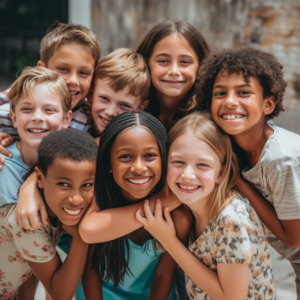 Bullying is a pervasive issue that affects children of all backgrounds. Unfortunately, with unlimited access to social media it seems that the prevalence of bullying has increased exponentially. Bullying can have a devastating impact on any child, but for those on the autism spectrum, the effects can be even more traumatic.
Bullying is a pervasive issue that affects children of all backgrounds. Unfortunately, with unlimited access to social media it seems that the prevalence of bullying has increased exponentially. Bullying can have a devastating impact on any child, but for those on the autism spectrum, the effects can be even more traumatic.
The social and communication difficulties often associated with those on the spectrum can make children more vulnerable to bullying, leaving them feeling isolated, anxious, and lacking in self-esteem and self-confidence.
It’s essential to equip children with the skills and confidence to stand up against it. Martial arts offers a non-traditional approach to addressing bullying, combining physical training with mental and emotional development.
Through martial arts, autistic children not only learn practical self-defense techniques but also develop resilience, self-advocacy, and self-awareness. By building a strong foundation of self-confidence, children can navigate the complexities of social interactions, recognize and assert their boundaries, and build healthy relationships.
Mental Resilience
It is inherent with the study of martial arts to emerge more knowledgeable about how to defend oneself physically. While this information is invaluable and can be utilized if the situation deems it necessary, let’s dive deeper into how you can defend yourself using your mind instead of your body.
The best way to do this is through developing mental resilience. Mental resilience is comprised of 3 main things: coping with adversity, emotional regulation, and stress management/frustration tolerance.
Children on the spectrum must cope with adversity daily. Whether it’s in a social sense, during the learning process, or even within their own bodies, autistic children often find themselves caught within a vicious circle of struggling to comprehend traditional neurotypical cues while being unsure of how to respond to them. Add this consistent adversity into the mix, and it often results in excess stress and an inability to regulate their emotions.

To turn this vicious circle into a more predictable, virtuous circle, it’s vital to instill the concept of managing stressors. Martial arts is an excellent method of releasing stress – through physical activity and practicing movements like punches/kicks, autistic children can work out their tension. Providing an alternative for “acting out” and demonstrating a pathway to rid themselves of emotional and mental baggage from being bullied is one of the most useful aspects of martial arts for autistic children.
In a bullying situation, children on the spectrum often place the onus of the situation upon themselves rather than the aggressor. Trusted family and friends will explain that they are not at fault, yet many children cannot grasp this and fall into a deep cavern of depression and self-doubt. Engaging in regular physical activity like martial arts provides a predictable outlet for them to release their excess mental and emotional “weight” and helps them cope with what they cannot control. Over time and increased proficiency, their perspective changes as their confidence increases.
Mental resilience is a key in the fight against bullies, and children who find themselves a victim of a bully must focus on it. Cultivating a strong mindset that is not easily shaken is a result of stress management. Once stressors become easier to deal with, it is easier to cope with adversity and regulate one’s emotions.
Self-Advocacy
 During a loss of confidence and self-belief, the ability to assert oneself is usually lacking. This is often one of the primary targets of bullies – when a bully recognizes that an individual is less likely to “fight back”, they tend to pursue them as they are less of a threat for retaliation. Autistic children suffer from this concept, perhaps more than neurotypical children, because they can have issues with expressing themselves fully and asserting their boundaries.
During a loss of confidence and self-belief, the ability to assert oneself is usually lacking. This is often one of the primary targets of bullies – when a bully recognizes that an individual is less likely to “fight back”, they tend to pursue them as they are less of a threat for retaliation. Autistic children suffer from this concept, perhaps more than neurotypical children, because they can have issues with expressing themselves fully and asserting their boundaries.
We know that practicing martial arts strengthens the physical body. Students may find their self-esteem growing as they feel physically stronger and more able to handle adversity. It also helps children cope with stressors by providing a safe outlet for negative energy and coaching to replace it through calm acknowledgement. But how does martial arts build a sense of mental confidence so a bully victim can become a self-advocate?
Studying any skill for a length of time will result in some degree of fluidity. Whether it’s learning another language or developing an affinity for a new sport, practitioners will inevitably increase their knowledge. Through regular martial arts practice and mastering techniques, bully victims will develop a sense of competence and belief in their new abilities. They may want to share their newfound skills or even bring others into their practice.
This increased self-confidence enables them to stand up for themselves more easily and assert their boundaries. At the highest levels of proficiency, practitioners can respectfully defend themselves through preventative channels like de-escalation and negotiation, using self-defense as a last option.
Skill acquisition is a vital key to increasing confidence and making the internal changes that one needs to feel that they can face their challenges. Because martial arts focuses on the mind and the body, it is an excellent option for those who have been victims of bullying.
Self-Awareness
Victims of bullying may experience a range of anxiety-based emotions, including fear, anger, depression, or insecurity. These emotions may become magnified and more difficult to reign in for children on the autism spectrum.
Martial arts gives participants the opportunity to study a sport that is not only challenging physically, but also mentally.
Through practice, individuals are encouraged to tune into their emotions, acknowledge them, and develop strategies to manage and channel them effectively. With this heightened self-awareness, practitioners realize that their anxiety is an intensity they can control. This emotional awareness helps bullying victims gain insight into their emotional triggers, empowering them to respond more thoughtfully and proactively in bullying situations.
Martial arts training also emphasizes body awareness, teaching individuals to be mindful of their own bodies and movements. By practicing various techniques, students develop a heightened sense of body awareness, including posture, balance, and coordination. Instructors will require heightened precision as the student advances in rank, and this precision will increase the students’ confidence in their body’s abilities to perform. This increased body awareness enables them to understand their physical presence, project confidence, and make deliberate choices in their actions and responses.
 Martial arts training holds immense potential for empowering bullying victims (neurodivergent and neurotypical) with the tools and mindset needed to overcome adversity.
Martial arts training holds immense potential for empowering bullying victims (neurodivergent and neurotypical) with the tools and mindset needed to overcome adversity.
It equips bullying victims with the strength and skills necessary to navigate the challenges they may face.
Through martial arts, individuals discover the power of their own mental resilience, allowing them to rise above the negative impact of bullying.
By embracing the practice of self-advocacy, victims of bullying find their voices and assert their boundaries. They gain the confidence to advocate for themselves, leading to a sense of empowerment and ownership over their lives.
Moreover, martial arts fosters self-awareness, providing individuals with a deep understanding of their physical and emotional selves. By developing body and emotional awareness, bullying victims become more attuned to their strengths, weaknesses, and emotional responses. This self-awareness enables them to make conscious choices, manage their emotions effectively, and engage in conflict resolution with greater confidence.
It is crucial to recognize that martial arts is not only a physical practice but a holistic journey of personal growth and empowerment. By cultivating mental resilience, self-advocacy, and self-awareness through martial arts, bullying victims can reclaim their sense of identity and discover their inner strengths.
CLICK HERE FOR MASTER GEORGE’S GUEST PODACAST APPEARANCE, DISCUSSING BUILDING CONFIDENCE AND INNOVATIVE MARTIAL ARTS TECHNIQUES FOR NEURODIVERGENT CHILDREN.

